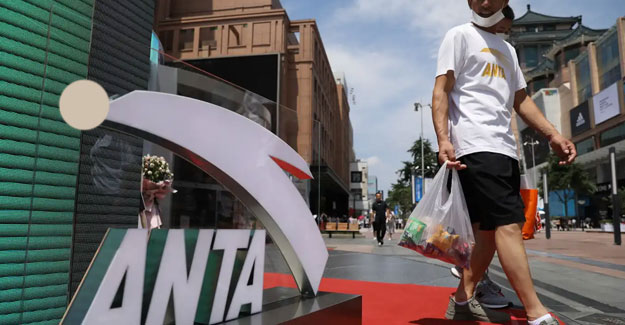
Chinese Sportswear Brands Profit From Xinjiang Controversy
College student Lin Hong long looked to Nike for his sneaker needs, buying five pairs of its basketball shoes over the past two years. Now he is eyeing the US brand's biggest Chinese rivals. "It's time to ditch Nike for Li Ning or Anta," he said, complaining that his latest Nike sneakers did not hold up well while the Chinese brands offer "vibrant designs and tougher soles." Thanks to consumers like Lin, Li Ning, founded by the Olympic gymnast of the same name, has signalled soaring half-year profit growth. Xtep International Holdings and Anta Sports Products, the fastest growing sportswear company in China's market over the past five years, are due to follow suit. While all three companies have highlighted a recovery in consumer demand since the eruption of the pandemic last year, that had little benefit for Western competitors in China like Adidas and Nike. Their sales suffered in the spring after state media and social media users blasted their previous expressions of concern about forced labour in the minority region of Xinjiang and company statements about avoiding cotton from the area. Many western brands have been impacted by this furor. Chinese celebrities broke off endorsement contracts with H&M, online mapping and ride-hailing services erased H&M stores from their systems, top internet shopping platforms dropped its products and some landlords cancelled store leases amid a boycott campaign. For the quarter to May 31, H&M's net sales in mainland China tumbled 28.1% to 1.62 billion Swedish krona (US$ 186.86 million) from a year before while its national store network contracted by a net 13 outlets to 489. Previously the chain's third-biggest market, China ended the quarter in sixth place. Adidas, meanwhile, recorded a 16.3% fall in greater China sales to 1 billion euros (US$ 1.18 billion) in the April-June quarter. Nike earlier reported that its greater China revenues for the March-May period rose 17% to US$ 1.93 billion, but this came as its global revenues nearly doubled from a year earlier. By contrast, Chinese brands publicly trumpeted their use of Xinjiang cotton, with Anta and others quitting the Better Cotton Initiative, a Geneva-based group seen as a key culprit in raising questions over the use of forced labour, and captured a wave of nationalist sentiment. Li Ning has said that it expects to report revenue growth of more than 60% and at least 1.8 billion yuan (US$ 277.65 million) in net profit for the first half of the year, potentially tripling the 683.27 million yuan it earned in the same period last year. The swing in consumer attitudes enabled Beijing-based Li Ning to cut back on discounting, with Daiwa analysts Adrian Chan and Sybil Hu projecting the company will report "a record-high net margin of over 18%" for the half year as some stores sold out of popular products. Li Ning shares have risen 86% since the party campaign against H&M started while Anta is up 44% and Xtep's stock has almost tripled in value. Xtep has told investors it will report profit growth of at least 65% for the half year while Anta has talked of a surge of more than 110% from revenue expansion of over 50% as it cut back on discounts. Anta recorded 1.66 billion yuan in profit a year ago. Buoyed by its new sales momentum, the Xiamen-based company laid out plans to analysts last month for expanding sales volumes and shifting its branding up market, with an eye toward pricing basketball shoes at as much as 1,500 yuan a pair to level up with Nike and Adidas. Is consumer sentiment shifting again towards western brands? Momentum, though, now appears to be shifting, with the Western brands regaining their footing in China while their domestic rivals' momentum from the Xinjiang controversy fades. Adidas Chief Executive Kasper Rorsted told analysts recently that the company's Chinese online sales returned to growth in June while overall sales were flat. Analysts believe sales picked up last month with high-profile appearances of the Western brands at the Tokyo Olympics, with Chinese sprinter Su Bingtian, who set an Asian record for the 100-meter dash, notably sporting Nike. "In our observation, discussions about 'Xinjiang cotton' have in most social media diminished in July-August," Citigroup analyst Xiaopo Wei wrote in a client note. "In recent weeks, Chinese state-owned media have been reporting Chinese athletes wearing Nike/Adidas uniform in Tokyo Olympics, leading to Chinese consumers' much more positive sentiments towards Nike/Adidas." Chinese brands facing new threats in the US While each of them generates almost all their revenues within China, they have looked to endorsements from National Basketball Association players to lift their brand profile. Senator Jeff Merkley and Congressman James McGovern, who head up the Congressional-Executive Commission on China, took aim at this link in June, writing to the NBA Players Association to urge members to break off contracts with Anta and Li Ning unless they halt use of Xinjiang cotton. Representative Scott Perry and three other congressmen wrote to the US Department of Treasury, meanwhile, calling on the agency to add Li Ning and Anta to a blacklist that would bar American companies and individuals from any business dealings with them.
Textile Excellence
If you wish to Subscribe to Textile Excellence Print Edition, kindly fill in the below form and we shall get back to you with details.












